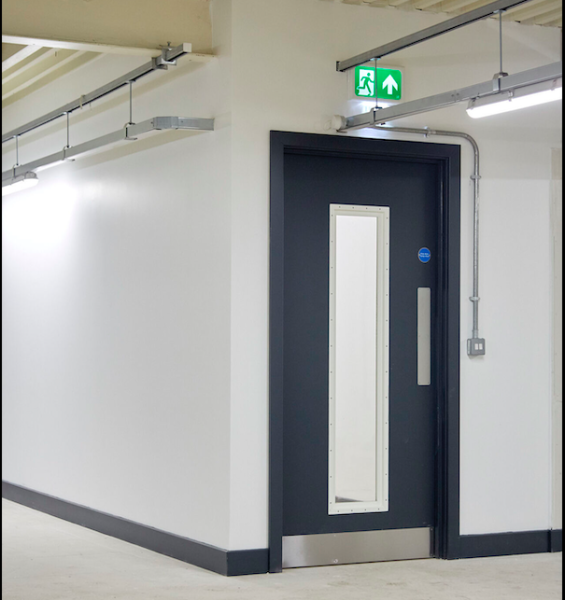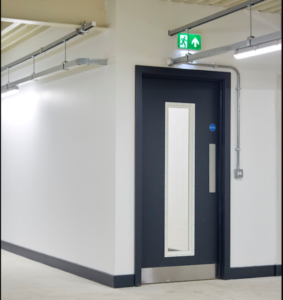For businesses in Scotland, fire safety is a legal obligation. This means the right use of fire doors in Scotland is vital for business owners.
Fire doors help protect both lives and property by providing a crucial. Not complying with these fire door regulations can result in severe penalties to Scottish business owners. Additionally, non compliance also poses a high risk to employees, visitors, and the building itself.
All this means that for business owners in Scotland, having a good understanding of the key regulations surrounding fire doors is critical. Additionally, failure to comply with these regulations could lead to legal repercussions. Read on to discover what the current regulations are, and how to protect your Scottish business from punishment.
What Are the Current Fire Door Regulations in Scotland?

Fire door regulations in Scotland are primarily governed by the Fire (Scotland) Act 2005 and the associated Fire Safety (Scotland) Regulations 2006.
Both these laws place a legal duty on both Scottish business owners, and those responsible for buildings. This ensures that fire safety measures (including fire doors) are in place and maintained.
Here are some of the key requirements under the current regulations:
Correct Installation
Fire doors must be installed correctly and in accordance with manufacturer guidelines. A poorly fitted fire door can drastically reduce its effectiveness in holding back fire and smoke. Even small gaps can allow smoke and heat to pass through. This then reduces the time available for safe evacuation.
Maintenance and Inspections
Fire doors should be checked regularly and maintained to ensure they function properly. The British Standard BS 8214 provides guidance on the installation and maintenance of timber-based fire doors, so this can help. Inspections should only be carried out by a competent professional. Any issues like worn seals, damaged hinges, or misaligned latches can compromise the door’s integrity.
Signage
All fire doors in your building must be clearly marked with the appropriate signage. This indicates that they must be kept closed at all times. Believe it or not, this is a simple yet often overlooked requirement by a lot of Scottish businesses. Clear signage ensures that employees and visitors understand the importance of keeping fire doors shut, preserving their ability to contain fire and smoke.
Self-Closing Mechanism
Fire doors should have a self-closing device installed. This ensures they automatically close after being opened. This is crucial, as a fire door left open is as ineffective as having no door at all. Self-closing devices should also be checked regularly to make sure they’re functioning correctly.
Certification
Fire doors must be certified and meet the relevant British and European standards, such as BS 476 Part 22 or EN 1634-1, to demonstrate their fire resistance. Certification provides assurance that the door has been tested under rigorous conditions and will perform as intended in the event of a fire.
What Do Businesses Need to Do to Stay Fire Safety Compliant?

Business owners must be proactive in ensuring their premises meet fire safety regulations. Don’t worry, our checklist below ensures you stay compliant and avoid penalties.

Need help With Fire Doors in Scotland?
TCS Response provides fire door installations across Scotland, certified fire door inspections, and remedial works to bring existing doors up to standard. Talk to our team about fire door services in Scotland today
Fire Risk Assessment
Conduct a comprehensive fire risk assessment. This helps identify potential hazards, and also checks that all appropriate fire safety measures are in place. This assessment should be reviewed regularly, especially if there are changes to the building layout, staff numbers, or business operations.
Install Certified Fire Doors
Ensure all fire doors installed meet certification requirements and are fitted by a qualified professional. Choosing a certified installer such as TCS Response can help ensure the doors are installed correctly.
Regular Inspections
Schedule routine fire door inspections to check for damage, wear, or general faults. Common Issues include gaps, broken seals, or malfunctioning self-closing mechanisms. Inspections should ideally be conducted every six months.
Training and Awareness
It’s important that staff are educated on the importance of fire doors and the necessity of keeping them closed. Regular training sessions can help with this, and make sure that employees understand what they can do to help maintain overall fire safety.
Record Keeping
Maintain accurate records of all fire safety inspections and maintenance work carried out. Detailed records can demonstrate compliance with regulations and provide evidence of due diligence in the event of an incident.
What Are The Consequences of Not Being Compliant?

If your business fails to comply with fire door regulations, there can be serious consequences.
Legal action, fines, or imprisonment can result from breaches of fire safety law. Additionally, inadequate fire safety measures can lead to loss of life, damage to property, and severe reputational harm.
The Regulatory Reform (Fire Safety) Order 2005 allows enforcement authorities to carry out inspections and issue enforcement notices if breaches are identified. In the most extreme cases, a prohibition notice may be issued. This requires immediate closure of the premises until safety issues are resolved.
Financial penalties can be significant. In a recent case, Cameron House was fined over £500,000 when a fire tragically took the life of 2 guests. In cases like this where negligence leads to fatalities, business owners or responsible individuals can face custodial sentences.
Beyond the legal and financial consequences, non-compliance can have a lasting impact on a business’s reputation. A fire incident linked to poor safety standards can undermine customer and employee confidence, leading to loss of business and difficulties in rebuilding trust.
The emotional toll on business owners and staff can also be substantial. Being responsible for an incident that results in injury or loss of life can have lasting psychological effects, further underscoring the importance of getting fire safety right.
TCS Response Can Help!

Ensuring your business meets fire door regulations in Scotland can be complex, but expert support is available.
TCS Response specialises in fire door installations, safety inspections, and remedial work across Scotland. Our team of certified professionals can help achieve compliance, giving you peace of mind that your premises are protected.
We understand the unique challenges businesses in Scotland face. Whether you need new fire doors installed, existing doors inspected, or remedial work carried out, we’re here to help.







